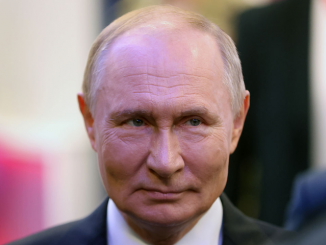
Ukrainian military vehicles driving past the border crossing point into Russia’s Kursk Oblast from neighboring Sumy Oblast, Ukraine on Aug. 13, 2024. (Roman Pilipey/AFP via Getty Images)
| Published April 26, 2025
Russian President Vladimir Putin announced that Russian forces had fully recaptured the Kursk Oblast, a region along the northeastern border with Ukraine that had been partially occupied by Ukrainian troops since August 2024. This marks the first time since World War II that Russian territory had been held by a foreign military.
In a significant development, Russia also officially confirmed the deployment of North Korean troops in the conflict, acknowledging that between 10,000 and 14,000 North Korean soldiers had fought alongside Russian forces in the Kursk region. This confirmation follows months of speculation and reports from Ukraine, the U.S., and South Korea about North Korea’s involvement.
However, Ukraine disputes Russia’s claims of full control over Kursk Oblast. Ukrainian officials assert that their forces continue to operate in parts of the region, maintaining defensive positions and conducting ongoing operations.
The involvement of North Korean troops in the conflict has raised concerns among international observers. Analysts question the combat effectiveness of these troops, citing issues such as inadequate equipment, language barriers, and lack of familiarity with the terrain. Despite these concerns, their deployment signifies a deepening military alliance between Russia and North Korea.
Meanwhile, diplomatic efforts to resolve the conflict continue. U.S. President Donald Trump and Ukrainian President Volodymyr Zelenskyy met briefly in Vatican City during the pope’s funeral to discuss the situation. While the meeting was described as constructive, a follow-up meeting was canceled. President Trump later expressed skepticism about President Putin’s commitment to ending the war, especially in light of recent Russian missile attacks on Ukrainian civilian areas.
The situation remains volatile, with ongoing military engagements and a complex web of international alliances influencing the trajectory of the conflict.
Overall Takeaway:
SOURCES: Kyiv denies Russia’s claim of Kursk Oblast recapture, as Moscow confirms North Korea role
REUTERS – Russia says last Ukrainian troops expelled from Kursk region, Kyiv denies assertion
AP NEWS – Russia says it has fully reclaimed the Kursk region. Ukraine says it is still fighting there.





Be the first to comment